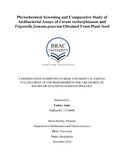Phytochemical screening and comparative study of antibacterial assays of carum roxburghianum and trigonella foenum-graecum obtained grom plant seed
Abstract
To control the infections and microbial food spoilage the application of chemical or synthetic
antimicrobial agents is one of the ancient techniques for which an enormous number of microbes
are escalating resistance to synthetic antibiotics. Therefore, there has been immense concern in
the development of efficient and nontoxic antimicrobial agents from natural sources, such as
extracts of plants for skirmishing comprised health condition and food preservation. In this
current research work, the crude extracts of Carum roxburghianum (radhuni) and Trigonella
foenum-graecum (fenugreek) were collected using two solvents namely Ethanol and Methanol.
Antibacterial effects of ethanol and methanol extracts taken of second, fifth and seventh days and
observed on selected eleven bacteria where extracts of different days had different effects on six
bacteria for radhuni showing positive result against Shigella flexinera, Salmonella typhi,
Staphylococcus aureus, Bacillus subtilis, Bacillus cereus and Streptococcus pneumonae and
fenugreek showed positive result only for Bacillus cereus. The ethanol extracts of both seeds
showed the greatest positive result where Radhuni from the fifth day against Bacillus subtilis and
Fenugreek from the seventh day against Bacillus cereus. Moreover, comparing the antibacterial
activities between radhuni and fenugreek seed extract, the zone of inhibition was greater for
radhuni than fenugreek against Bacillus cereus. The activity index of ethanol extract of day five
was the highest against Shigella flexineri indicating high sensitivity to the extract. Phytochemical
assay such as tests for alkaloids, terpenoids, tannins, saponins, steroids, phenolic compounds,
flavonoids and cardiac glycosides was performed on both seed extracts to identify the secondary
metabolites present in them. The results achieved from this research can act as a milestone in
exploring the new arena of antimicrobial properties of both extracts chiefly for radhuni extracts.
This study could be the starting of discovering some novel and less expensive microbial agent
against various bacterial species.

